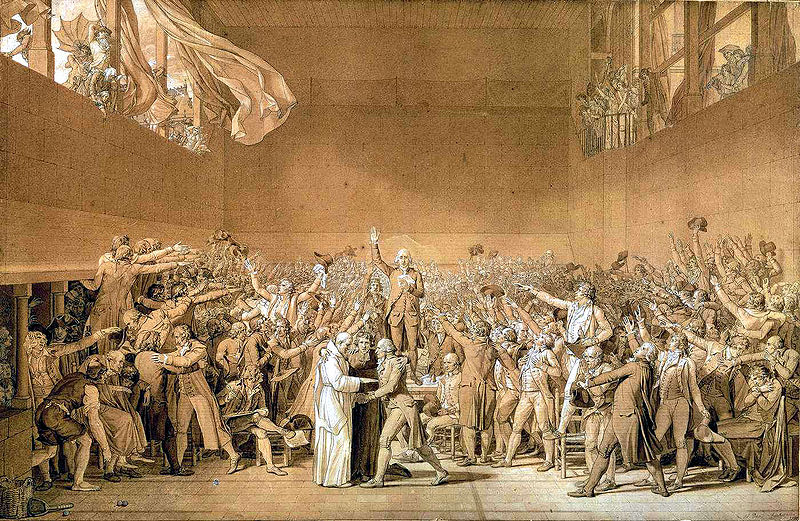|
|||
|
Philatelia.Net / French revolution / Plots / The directory «Plots»The Tennis Court Oath (Serment du jeu de paume)The Tennis Court Oath was a pivotal event during the first days of the French Revolution. The Oath was a pledge signed by 576 of the 577 members from the Third Estate who were locked out of a meeting of the Estates-General on 20 June 1789. They made a makeshift conference room inside a tennis court located in the Saint-Louis district of Versailles, near the Palace of Versailles. On 17 June 1789 this group, led by Honoré Gabriel Riqueti, began to call themselves the National Assembly. On the morning of 20 June, the deputies were shocked to discover that the chamber door was locked and guarded by soldiers. Immediately fearing the worst, and anxious that a royal attack by King Louis XVI was imminent, the deputies congregated in a nearby indoor real tennis court where they took a solemn collective oath "not to separate, and to reassemble wherever circumstances require, until the constitution of the kingdom is established". It later transpired that the most probable reason why the hall was closed was that the royal household was still in mourning over the death of the Dauphin (the king's oldest son) two weeks earlier; ordinarily, political matters could not be conducted until the King had emerged from mourning. The oath is therefore a contentious point in French political history, since pro-monarchists then and now characterize it as a duplicitous and hysterical over-reaction which deliberately made capital out of a private tragedy in the royal family. Other historians have argued that given political tensions in France at that time, the deputies' fears, even if wrong, were reasonable and that the importance of the oath goes above and beyond its context. The deputies pledged to continue to meet until a constitution had been written, despite the royal prohibition. The oath was both a revolutionary act, and an assertion that political authority derived from the people and their representatives rather than from the monarch himself. Their solidarity forced Louis XVI to order the clergy and the nobility to join with the Third Estate in the National Assembly. The only deputy recorded as not taking the oath was Joseph Martin-Dauch from Castelnaudary. He can be seen on the right of David's sketch, seated with his arms crossed and his head bowed. The Oath signified the first time that French citizens formally stood in opposition to Louis XVI, and the National Assembly's refusal to back down forced the king to make concessions. The Oath also inspired a wide variety of revolutionary activity in the months afterwards, ranging from rioting across the French countryside to renewed calls for a written French constitution. Likewise, it reinforced the Assembly's strength and forced the King to formally request that voting occur based on head, not order. Moreover, the Oath communicated in unambiguous fashion the idea that the deputies of the National Assembly were declaring themselves the supreme state power. From this point forward, Louis XVI would find the Crown increasingly unable to rest upon monarchical traditions of divine right. In terms of his political sympathies, Louis XVI was noticeably more liberal than any of his predecessors or immediate family. However, given personal circumstances and the death of his son, he had badly mismanaged the mood of the Assembly. As well as giving the Left and reformist movement, the Oath also galvanized the French Right. In royalist and conservative circles, the oath was seen as an indicator of the Assembly's commitment to anarchy and it was felt that a more robust form of counter-revolutionary politics were needed to ensure the survival of the monarchy. Bequia, 1989, The tennis court Oath Burkina Faso, 1989, The Tennis Court Oath Ecuador, 1989, French Revolution France, 1939, The Tennis Court Oath France, 1989, The Tennis Court Oath Guinea, 1989, Bailly and The Tennis Court Oath Madagaskar, 1989, Mirabeau at States General Madagaskar, 1989, The Tennis Court Oath Maldives, 1990, The Tennis Court Oath Nicaragua, 1989, Oath at the Tennis Coart Pakistan, 1989, The Tennis Court Oath Rwanda, 1990, The Tennis Court Oath San-Marino, 1989, The Tennis Court Oath Togo, 1989, The Tennis Court Oath UNO (Geneva), 1992, The Tennis Court Oath Vietnam, 1989, The Tennis Court Oath France, 1989.06.20, Advertising: |
|||
© 2003-2025 Dmitry Karasyuk. Idea, preparation, drawing up
|

